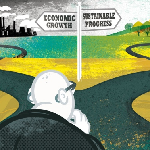
Carbon Deposits should not be ASSETS underpinning Share Value by Bail-out our Future
 Climate Rescue Mar 3, 2014 07:58 |
Even just the speculation that fossil assets would be written down could hit share prices and investment.
Underlying issue is pricing of externalities. If this is fixed then carbon assets would be marked down as a consequence. Question whether to focus just on carbon, which creates a market distortion in favour of nuclear and waste-burning? This previous proposal avoids the distortion. https://www.climatecolab.org/web/guest/plans/-/plans/contestId/4/phaseId/12/planId/15101
|
 Francis Van Staa Mar 3, 2014 10:02 | Proposal contributor
Thanks James!
Devil's Advocate /on
Speculation the fossil fuel assets might be written down has started with 350.org and the notion that 80% (or more!!) should stay in the ground. So far I do not see a significant effect on share prices even though Divestment is gaining ground. Perhaps Norway's Sovereign Wealth Fund divesting may provide a better indication.
Devil's Advocate /off
The biggest elephant in the room I have NOT (yet?) been able to address is the 75% deposits that are owned / controlled by Governments instead of companies.
Waste-burning is on my (s)hitlist but emits considerable amounts of GHG, would have a "very low merit order" Burning wood pellets is not much better BTW.
Nuclear energy depends on uranium (mostly anyway) but I figure we need to deal with PRESENT GHG EMISSIONS, once that is dealt with we can try to roll back past emissions and other desirable objectives. And who knows: someone may come up with a truly SAFE design?!
|
 Vantte Kentta Mar 3, 2014 03:27 |
First just a few wild thoughts:
James has a very good new proposal… If 40y has not been enough… Are we going to be late… Exactly the thing I was pondering: "you can’t find any instruction manuals for a global system change". There are no examples of a global civilization making any system changes anywhere in world history. Partly because our generation is “the” first global civilization (with tools of global communication). This also means that unfortunately we also happen to be the generation that has to solve a "test".
I view our current predicament as sort of an "intelligence test for species". Intelligence (the ability to control the environment through science and tools) in itself involves growth. Growth until the species bangs its head at planetary boundaries. Its only logical, that any sort of intelligent species grows until it comes to the point where it bangs its head at planetary boundaries. At that point either the intelligent species learns to live within those planetary boundaries, or it fails the "intelligence test for species".
The "intelligence test for species" is by no means a small feat. First thousands and thousands of years of growth. The entire culture develops an inner paradigm of growth, growth in any way possible. Then within a heartbeat the species must stop growing and find a new balance within planetary boundaries. How is this possible?? How do paradigms change? Only facts that contradicts the current paradigm can cause a change of paradigms.
So now our generation has just a heartbeat to change an entire global civilization before the banging starts to seriously hurt.
Now to the juicy parts:
What are the facts? Oil or other fossil fuels are not illegal. And they will never become illegal, oil is needed to make plastics. Therefore searching for oil can not be made illegal either. Oil and other fossil fuels are needed as raw materials, far into the future. Only when oil or other FF are used as energy do they become hazardous, as carbon. Therefore big oil can always justify their existence as crucial to society. Big oil is a pure white dove, it only sells to the highest bidder, it’s a law-abiding citizen, its the energy utilities that emit carbon that are to blame. “Everyone else is at fault that carbon offsetting is not working, big oil is not to blame.”
When we finally get a price on carbon the energy utilities (and consumers) will be the ones who pay. But its very strange that the producers of FF will be exempted. Much more logical would be to hold the producers responsible. Every other facet of society works that way. If a product causes expenses to society, it should also be the producer who pays for those expenses. Past and present expenses! The selling of the product should be priced to pay for all the past and present expenses of the product. Lord Nicholas Stern has calculated how much money climate change will cost in the coming years. All that money should be taken from the reserves of FF that are now counted as assets. FF should, and with all probability will have a price so high that they are simply unusable as energy. And stock holders of FF producers should demand all cash immediately from FF producers, otherwise that cash will probably be seized by governments as payments on the expenses on floods, droughts, desertification’s, hurricanes. Lawsuits by individuals and governments etc.
Now all of this holds so many hazards to the global financial stability that governments, central banks and international institutions need facts. They need facts for policy recommendations. As the facts stand today with climate change, we are looking at a financial meltdown of unheard of proportions. These new facts simply need some sort of a plan of a new global financial stability.
|
 Clifford Goudey Mar 14, 2014 08:45 |
Is it possible to simply tell a company that they can no longer count their assets as assets? I'm doubtful. Doesn't a gradually increasing carbon tax accomplish the same thing without having to craft such a exception in accounting rules?
If a company ones those reserves, then their valuation should reflect the current market price. If it becomes recognized that we indeed have far more reserves then we will ever need, then the value drops - pretty simple.
|
 Francis Van Staa Mar 21, 2014 02:28 | Proposal contributor
Cliff, AFAIK there are strickt rules attached to having stock on a stockmarket. And I understand the BIS bank and National Banks have a duty to protect shareholders and system stability, not nessesarily in that order BTW.
Everyone might be better off by gradually deflating the carbon bubble, not wait for the sudden crash.
I guess the system is flawed, my idea might very well also be, but we need to get out of this mess! People with Billions are propping up shareprices and the carbondeposits, once they learn that there's an end to that game they may change to investing in sustainable energy
|
 Robert Dedomenico May 3, 2014 12:22 |
This proposal is nonsense.
|
 Jeff Harti May 8, 2014 01:07 |
@francis: Thank you for the proposal.
@robertdedomenico: Thank you for participating, but it would be appreciated if you could keep your comments constructive. The whole point of this initiative is to work together to propose, improve, and refine solutions to climate change; not criticize a proposal in a way that does not help to improve it.
@climaterescue, @vankent, and @cliffgoudey: Thank you for participating in the discussion as well!
|
 Michael Brown May 22, 2014 10:13 |
I think the term you are looking for is 'stranded assets'. This is a very serious consideration.
You mention $0.5B per year for exploration activities. I don't have a number to quote but I think you are underestimating this figure by at least an order of magnitude. Imagine if this funding, technical expertise, and political will were focused on renewable/alternative energy...
You suggest that 75% of all carbon deposits should stay in the ground. You have some numbers here but they need to be sourced.
Can you expand and quantify this claim? For example, keeping global average temperature change at less than +2degC is frequently cited as an important target, and there is a mass of carbon associated with this change (based on climate models, which are continually being refined). I think your 75% figure is not bad, which is very troubling if you think about the implications.
You're being dismissive and trivial in the cost section, which will not win you any investors. Delete your cost section, think about it for a while, and start again. Cost estimation is hard. Consider approaching the problem in high-level terms such as $/kWh (on a life-cycle basis).
You have a great concept but you need to think about implementation. It's not enough to state that changes have to be made to financial accounting rules. How, exactly or conceptually, do we achieve this?
Keep it up.
-Mike
|
 Takako Wakiyama Jun 6, 2014 07:36 |
This idea is good, but since there are similar environmental accounting system and other related carbon accounting system, at first, it might better to examine the benefits and challenges of the conventional environmental accounting system and how to improve the system. Environmental accounting system has been implemented in various countries, but it has not yet become widespread. It should have many barriers to implement and deploy this system. In addition, make it clear the differences from the system to apply this carbon deposits system. It can be understood that it takes time to change the financial accounting rules, thus it starts from raising issues to discuss the application of the system and how to introduce and implement it.
|
 Mark Johnson Jun 17, 2014 07:00 |
Hello Bail Out Our Future -
You proposal is definitely noble, but your noble vision will take much, much more time to fruition. The reason is the "World Vehicle Fleet" is hooked on fossil fuels. Consumer tastes and preferences drive what car engineers design for increased market share. Only 3% of the USA car fleet is made up of hybrids: http://en.wikipedia.org/wiki/Hybrid_electric_vehicles_in_the_United_States
I am sure you support Boone Pickens' Natural Gas vision to fuel all semi-trucks.
There must be a national/global infrastructure for the distribution of fuel alternatives, e.g., Tesla recently completed its first coast-to-coast charging station route. Recharging only takes 38 minutes but there still needs to be untold dollars spent to provide a national Tesla/Electric Vehicle infrastructure.
Regarding your thoughts on oil - per your citation:
"We should have the accounting rules adjusted/changed, so that over a period (say 5 or even 10 years?) the existing carbon deposits are devalued, no new deposits added, so that at the end of that period no more carbon deposits are listed on the balance sheets, underpinning share value."
This is again a noble thought, but because of the rationale presented above, Exxon cannot devalue its proven reserves because America-World is hooked on oil and Exxon exists to make money for shareholders. That reality is separate from your correct view that reserves cannot be overstated. So, there are no non-fossil fuel solutions to support America's immediate and long term demand for oil. Soccer parents want to show up at the game in their Cadillac Escalades, Range Rovers or the mega dollar Bentley Continental SUV.
Nobel intentions you have no doubt. Mark
|
 Felipe De Leon Jun 18, 2014 01:37 |
Hi,
The concern you are raising is definitely valid and is part of the argument in the movement to divest from fossil fuels. You might be interested in the Smith School's Stranded Asset Program, particularly this report (http://www.smithschool.ox.ac.uk/research/stranded-assets/SAP-divestment-report-final.pdf)
Keep up the good work!
|
 Mark Johnson Jun 18, 2014 10:33 |
Thank you Filipe. I am studying the Oxford URL you provided. For other readers here, I have cut and pasted excerpts from the Executive Summary. My view is the Oxford team has their hearts in the right place, but this is very long term - perhaps another 75 years or more, since there are such divergent views, energy needs, nationalism, legal systems, etc. Oxford is a highly respected institution.
Oxford Report Excerpts from the Executive Summary
"Stranded assets" where assets suffer from unanticipated or premature write-offs, downward revaluations or are converted to liabilities, can be caused by a range of environment-related risks. This report investigates the fossil fuel divestment campaign, an extant social phenomenon that could be one such risk. We test whether the divestment campaign could affect fossil fuel assets and if so, how, to what extent, and over which time horizons. Divestment is a socially motivated activity of private wealth owners, either individuals or groups, such as
university endowments, public pension funds, or their appointed asset managers.1 Owners can decide to withhold their capital—for example, by selling stock market-listed shares, private equities or debt—firms seen to be engaged in a reprehensible activity. Tobacco, munitions, corporations in apartheid South Africa, provision of adult services, and gaming have all been subject to divestment campaigns in the 20th century. Building on recent empirical efforts, we complete two tasks in this report. First, we articulate a theoretical
framework that can evaluate and predict, albeit imperfectly, the direct and indirect impacts of a divestment campaign. Second, we explore the case of the recently launched fossil fuel divestment campaign. We have documented the fossil fuel divestment movement and its evolution, and traced the direct and indirect impacts it might generate. In order to forecast the potential impact of the fossil fuel campaign, we have investigated previous divestment campaigns such as tobacco and South African apartheid. Aims of the fossil fuel divestment campaign The aims of the fossil fuel divestment campaign are threefold: (i) ‘force the hand’ of the fossil fuel companies and pressure government—e.g. via legislation—to leave the fossil fuels (oil, gas, coal) ‘down there’2 ; (ii) pressure fossil fuel companies to undergo ‘transformative change’ that can cause a drastic reduction in carbon emissions—e.g., by switching to less carbon-intensive forms of energy supply; (iii) pressure governments to enact legislation such as a ban on further drilling or a carbon tax. Inspiration for the fossil fuel divestment idea leans heavily on the perceived success of the 1980s South Africa divestment campaign to put pressure on the South African
government to end apartheid.
|
 Joe Nyangon Jun 18, 2014 02:10 |
I support the proposal but it needs more work to distinguish it from other conventional environmental accounting systems. What is it you think you will be doing differently?
|
 Jessica Thompson Jun 24, 2014 03:26 |
Thank you BOOF! A proposal that has sparked much debate.
- The concept has some merit in that devaluing these assets would remove some incentive for further exploration - but how would the proposal seek to achieve this? What kind of colossal changes (and costs) would this entail? How would this be achieved on a simultaneous global scale and what would happen if it were uneven? Your idea of bookkeeping is getting warmer and the World Bank is getting colder.
- Valuations of oil majors happen based on industry standards and real and reasonable assessment of the future revenue generating potential of the companies based on their assets. In short, it is meant to be a realistic assessment. Imposing a false accounting regulation that exempted one class of assets would be sort of like cutting off their leg while they are still walking on it. Does the proposal imply that these reserves will not be burned? Is the deflation a stand-alone measure and the companies would go on exploiting the current reserves?
- Agree with Michael_Brown. Think again about the costs associated with this program - not just the marketing and political costs but the actual financial cost to these companies and ripple effects throughout the economy.
- Does the proposal focus solely on an accounting practice change or pretend to halt fossil fired power generation?
- Correct objection above regarding most fossil assets belonging to countries. What are the geopolitical costs of declining energy security?
- Not addressed in the proposal is where 80% of our global power generation would come from in the absence of fossil fuels?
Nonetheless interesting and more investigation into bullet one above is needed. It may be helpful to acknowledge some of the above problems and then continue with the investigation as an accounting practice measure that would be implemented as part of a suite of practices.
Jessica
|
 Climate Colab Aug 13, 2014 04:19 |
Companies are valued based on their ability to generate a cash flow stream. Accounting conventions are useful to the extent that they provide a snapshot of a company's ability to generate cash. If accounting rules were changed in a manner that misrepresented the true cash generation capability of a business, investors would stop using them as a basis for valuation. As long as E&P companies can convert fossil fuel reserves into cash, these reserves will be appropriately valued by investors. This is true whether or not the correct value of these reserves is posted on the balance sheet.
|